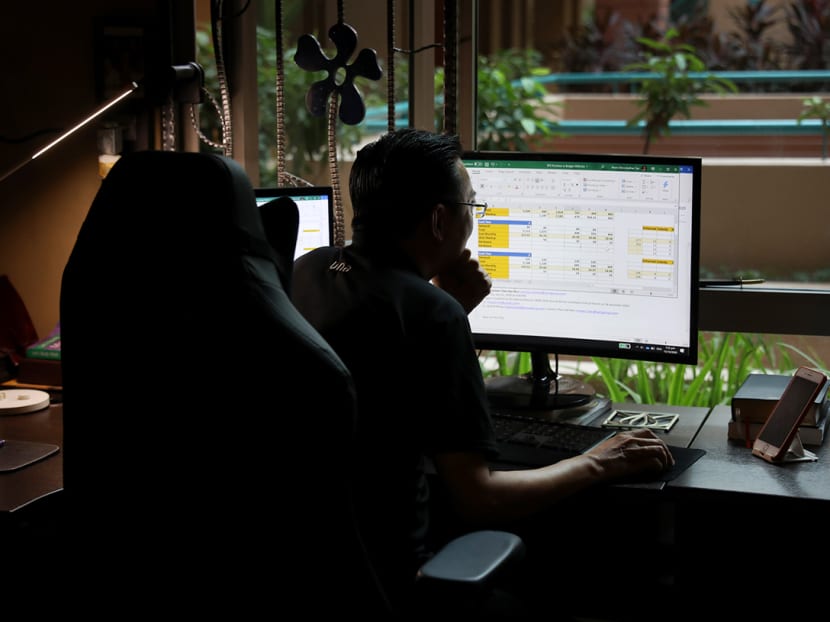The Big Read in short: The need for boundaries when working from home
Each week, TODAY’s long-running Big Read series delves into the trends and issues that matter. This week, we look at how employees and bosses are affected by the blurring of lines between work and home, as remote working becomes the default arrangement amid the Covid-19 pandemic. This is a shortened version of the full feature.

Mr Jonathan Tan, managing director of UnaBiz, an Internet of Things network operator, said he had initially struggled with the transition to working from home.
Each week, TODAY’s long-running Big Read series delves into the trends and issues that matter. This week, we look at how employees and bosses are affected by the blurring of lines between work and home, as remote working becomes the default arrangement amid the Covid-19 pandemic. This is a shortened version of the full feature, which can be found here.
- With the blurring of lines, many employees — and bosses too — find themselves being pushed to the limits while working from home
- Situation made worse by their worries over the economic uncertainty, and feeling the need to put in extra effort to keep their job
- Enlightened bosses can make a difference, said employees and HR experts
- Some firms are leading the way to ensure their staff can disconnect from work and have time for themselves
- Ultimately, employees must learn how to push back and set their own boundaries, said one HR expert
SINGAPORE — After battling with the thought of quitting her job for weeks, Adriana (not her real name) decided that she had had enough after her third visit to the clinic for chest pains saw her being referred to the accident and emergency department in a hospital.
Her first two visits were for headaches from lack of sleep and stress, and for gastric pains from skipping meals and taking painkillers.
Adriana, who worked in communications, found herself working seven days a week, often past midnight and during meal times. She said she would often start work at 9am the next day despite staying up till 4am.
While she worked late nights previously, working until 4am only became commonplace after she began working from home.
“My GP (general practitioner) said to me ‘Nowadays, people either get Covid-19 and suffer or they don’t and suffer while working.’
“I even had to take a work call before going to the A&E because we were just really short handed,” said Adriana, in her mid-20s.
She was told after a series of tests that her chest pains were a symptom of anxiety and she had experienced a panic attack.
Speaking to TODAY, she recounted how her days dragged on and were filled with unscheduled calls because being home meant that her colleagues and clients assumed she would be available for work calls at all times. Her bosses also thought that work could be delivered within tight timelines as everything was done digitally.
“If we took leave to rest or were on medical leave, they assumed we had nothing to do because we’re home anyway and would still ask us to follow up on work,” said Adriana.
With “homeworking” taking root amid the Covid-19 pandemic, many employees in Singapore find themselves being pushed to the limits, as the boundaries between work and home become blurred.
And as some experts warn against upsetting the work-life balance — which remains the holy grail for many — one Member of Parliament (MP) has recently called for a law to guarantee that an employee’s personal time is safeguarded.
Like Adriana, 25-year-old Stella (not her real name) also made the difficult decision to leave her job in the food and beverage industry because her neverending work was starting to affect her mental health.
Stella said she would work 12 to 15 hours a day, from the moment she woke up until past midnight where she went straight to bed. She was unable to take breaks during the day and was forced to skip many meals.
“It was horrible because I had to react to a lot of issues that had to be resolved right away with our partners. There were no lines drawn and I basically worked around the clock, even on weekends,” she said, adding that her work environment was positive and ideal before remote working began.
Since Sept 28, more employees in Singapore have been allowed to return to the workplace, although safe-management protocols must be in place and employers are encouraged to implement measures such as flexible working hours and staggered reporting times.
Employers must also ensure that such employees continue to work from home for at least half of their working time, and no more than half of such employees are at the workplace at any point in time.
And it is not only employees who have had to grapple with mental stress and long hours; even those in management positions have had their fair share of problems in dealing with the new work arrangements.
One of them, Mr Jonathan Tan, managing director of UnaBiz, an Internet of Things network operator, told TODAY that he had initially struggled with the transition to working from home.
But things are more manageable now, after he sought to establish clear boundaries between work time and personal time.
Mr Tan, 52, said the need to be ever-present at work and virtual meetings over Zoom quickly took a toll on him.
“It’s so easy to set up meetings on Zoom so there were suddenly more meetings than ever before,” he said.
“Zoom meetings are also inherently more stressful because there are so many faces focused on you and when you feel that everyone is looking at you, it can be very straining.”
As working from home continues to be the default mode of working for many, labour MP (Radin Mas) Melvin Yong proposed in Parliament on Oct 6 that the Government consider incorporating aspects of “right to disconnect” legislation in an upcoming advisory on mental health of workers.
Mr Yong had first urged the Government to consider a “right to disconnect” law in August during the debate on the President’s Address in Parliament.
Such a law was first enacted in France in 2017. Workers in an organisation that has more than 50 employees are forbidden from sending or replying to emails after certain hours. Other countries such as Italy and the Philippines have since taken steps to push forth similar legislation.
However, Senior Minister of State for Manpower Zaqy Mohamad, in his reply to Mr Yong, noted that since many workers in Singapore are employed in companies covering different time zones, it might not be feasible to pass laws that would give workers the right to ignore work calls and emails after business hours.
Mr Zaqy added that the rigid enforcement of the boundary between work and personal life might also impede some workers, who enjoy the flexibility of caring for their children, running errands in the day and working at night.
ENLIGHTENED BOSSES CAN MAKE A DIFFERENCE
To help their employees disconnect from work, some bosses TODAY spoke to have implemented new practices and ways of working to enable their staff to get work done and prioritise personal and family time.
Since remote working began for his team, Mr Adam Esoof Piperdy, chief executive officer and founder of events company Unearthed Productions, decided to purchase workplace communication platform Slack to create a distinction between work messages and casual chats on WhatsApp.
Mr Piperdy has also implemented mandatory no-meeting days on Friday as a “mental break for everybody just to chill out, kind of like extended weekend”.
For the rest of weekdays, last meetings of the day are scheduled to start at 5pm so that they can end by 6pm. He has also made it known to his employees that after 6pm, they do not need to respond to any work-related WhatsApp messages.
Mr Paul Fong, country manager at Dow Singapore & Malaysia, said that despite being a multinational company, his firm also does not encourage meetings on Friday evenings.
Dow is a global materials science company.
“At least once a month, we also allow our employees to knock off an hour earlier on Friday so that they can start the weekend early and spend quality time with their families and friends,” he added.
Over at web development and digital marketing firm FirstCom Solutions, general manager Lynn Wong said that about 80 of her client-facing employees have been given corporate mobile phones.
“They are unable to disconnect as they don’t really check the time and they get very engrossed with replying to messages at any time of the day.
“With the work phone, they can actually detach (themselves) from needing to check on the phone (outside) of working hours, as compared (to) using their own phones,” she said.
EMPLOYEES NEED TO PUT THEIR FOOT DOWN
On Oct 14, MP Mr Yong again spoke in Parliament about the “right to disconnect” issue, noting that a law would help employees have protected time to rest and recharge.
However, some human resource experts told TODAY that it is unrealistic to implement “right to disconnect” legislation in Singapore.
Ms Angela Kuek, director of recruitment firm Meyer Consulting Group, said: “I think they can encourage these kinds of practices, but how much of it is actually put in play or how successful all these can be is another question.
“It comes down to Asian culture and mentality. We work more hours, bosses need more visibility and facetime, and you have to be responsive. This work ethic has been around for decades in Singapore so one hard and fast rule will not work.”
She added that implementing such rules to promote work-life balance has to start with the leadership team, and there is “no use” for the company’s human resources department to implement such policies if the managers are still going to demand for work to be done after hours.
Ms Carmen Wee, a veteran HR practitioner, said one way employers can create better work-life balance for their employees is to build trust and stop micromanaging.
This is especially needed at a time when workaholism is perpetuated due to employees’ fear of losing their jobs amid the current economic situation, she said. It is, therefore, important for supervisors to be enlightened.
On how employees can set boundaries for themselves, Mr Paul Heng, founder of NeXT Career Consulting Group, said that setting expectations is the rule of the game, and employees have to make it crystal clear that they are not going to be on call, unless it is an emergency.
Ms Wee said that if employees are unable to set boundaries through open communication with their managers — which she says should be the first step — they should talk to their HR personnel in a confidential setting. Some companies also have alternative channels for feedback that employees could take advantage of.
Mr Heng said once the boundaries are set, the employees concerned should “try hard not to make exceptions”.
“When your colleagues and bosses get to know that their emails are not going to get responded to, they would, over time, learn to manage their own expectations... Soon enough, they will accept it,” he added.











